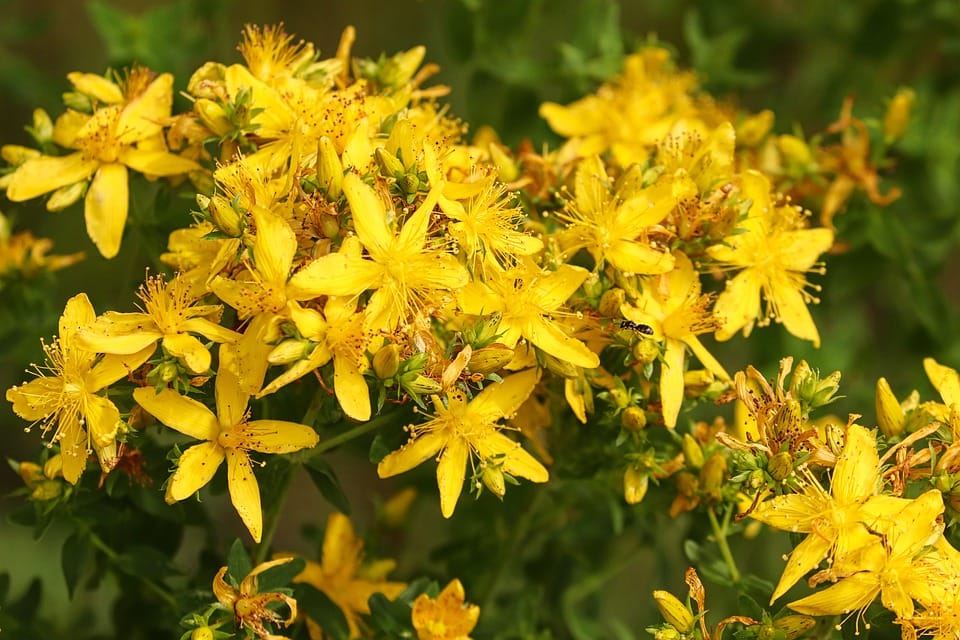St. John's Wort: Benefits, Uses, and Side Effects

St. John’s Wort has been used for centuries in Asia as a natural remedy for various ailments due to its benefits, including treating depression, anxiety, and sleep disorders.
In recent years, it has gained popularity as a treatment for mild to moderate depression. Studies suggest it may be as effective as some antidepressants, with fewer side effects.
Beyond depression, St. John’s Wort is also used to address a range of other conditions, which we will explore in this article.
Origin of St. John’s Wort
Also known as St. John’s Wort, it has a long history of medicinal use. Its origins trace back to ancient Greece, where it was believed to treat snake bites and mental illnesses.

In the Middle Ages, St. John’s Wort became associated with St. John the Baptist, whose feast day is celebrated on June 24, coinciding with the herb’s usual blooming period. It was believed the herb gained its healing power from the sun’s rays on that day.
During the 17th and 18th centuries, the herb became a popular remedy in Europe for treating depression, anxiety, and sleep disorders. By the 19th century, scientists began studying its medicinal properties, and in the 20th century, St. John’s Wort gained global recognition as a natural remedy.
Today, the herb is widely used to treat various conditions, including depression, anxiety, and sleep disturbances. It is believed to work by increasing levels of neurotransmitters in the brain, such as serotonin, dopamine, and norepinephrine, which help regulate mood.
Although generally considered safe when used at recommended doses, it’s essential to consult a doctor before using it, especially if you are taking other medications, to fully benefit from its properties.
Types of St. John’s Wort
Hypericum perforatum, commonly known as St. John’s Wort, grows in temperate regions of Europe and Asia.
Other varieties of St. John’s Wort include:
- Hypericum calycinum
- Hypericum connatum
- Hypericum maculatum
- Hypericum tetrapterum
All types of St. John’s Wort contain chemical compounds called hypericins, responsible for the herb’s medicinal effects. However, the amount of hypericins varies across species.
It’s crucial to use the correct type for medical purposes. Hypericum perforatum is the only well-researched species with proven efficacy in treating depression, anxiety, and sleep disorders.
If you’re considering using St. John’s Wort, consult a doctor first. They can determine if it’s suitable for you and help you find the right dosage.
st. john’s wort benefits
St. John’s Wort, also known as Hypericum perforatum, is a yellow flowering plant that grows in temperate regions of Europe and Asia. It has been used for centuries as a natural remedy for various ailments, including depression, anxiety, and sleep disorders.
Health Benefits of St. John’s Wort:

Depression: Many studies suggest that St. John’s Wort may be effective in treating mild to moderate depression. It is believed to work by increasing neurotransmitter levels in the brain, such as serotonin, dopamine, and norepinephrine, which play a role in mood regulation.
Anxiety: St. John’s Wort may also help relieve anxiety symptoms, including general anxiety and panic disorder.
Sleep Disorders: It may improve sleep quality for individuals suffering from insomnia.
Menopausal Symptoms: Some studies indicate that St. John’s Wort can help reduce symptoms of menopause, such as hot flashes and night sweats.
Benefits for Obsessive-Compulsive Disorder (OCD):
Some studies show that St. John’s Wort may be effective in treating OCD. It is believed to work by increasing serotonin levels in the brain, which is thought to play a role in regulating mood and anxiety.
One study showed that St. John’s Wort was as effective as clomipramine, an antidepressant commonly used to treat OCD. Another study found that it was more effective than a placebo in reducing OCD symptoms.
St. John’s Wort for sex
It has long been used in traditional medicine to improve mood and treat mild depression. It is believed that the mood-enhancing effects of St. John’s Wort may help increase sexual desire, especially if the issue is related to stress or anxiety. The herb contains natural compounds that affect brain chemistry, such as serotonin, which makes you feel calm and relaxed. However, there is no strong evidence to support its direct effectiveness in improving sexual performance.
It’s important to know that this herb may interact with other medications, such as birth control or antidepressants, which could cause problems. Therefore, it’s best to consult a doctor before using it to avoid any harm or side effects.
How to use St. John’s Wort
It can be prepared in several different ways, including:

Tea:
- Place the herb in a cup.
- Pour boiling water over the herb.
- Cover the cup and let it steep for 10-15 minutes.
- Strain the tea and drink it.
St. John’s Wort Extract:
- Follow the dosage instructions on the label.
- You can add the liquid extract to water or juice to enjoy the benefits.
Capsules:
- Follow the dosage instructions on the label.
- Capsules can be taken with or without food.
Oil:
- Apply the oil to the affected area 2-3 times a day.
- It’s important to use St. John’s Wort at the recommended dosage. The usual dose for treating depression is between 300 mg to 900 mg per day, divided into multiple doses.
st. john’s wort uses
It is used to treat a variety of conditions, including:
- Depression
- Anxiety
- Sleep disorders
- Menopausal symptoms
- Obsessive-Compulsive Disorder (OCD) and Attention Deficit Hyperactivity Disorder (ADHD)
Dosage:

St. John’s Wort (Hypericum perforatum) comes in various forms such as capsules, tablets, tea, and liquid extract. The usual dose for treating depression ranges from 300 mg to 900 mg per day, divided into multiple doses.
st. john’s wort side effects
Although generally considered safe when used at recommended doses, there are some potential side effects and risks to be aware of:
Side Effects:
- Stomach upset
- Dizziness
- Headache
- Dry mouth
- Rash
Drug Interactions:
- Antidepressants
- Birth control pills
- Blood thinners
- Immunosuppressants
It’s important to consult with a doctor before using St. John’s Wort, especially if you’re taking other medications.
Sun Sensitivity:
The herb can increase your skin’s sensitivity to sunlight. It’s important to avoid direct sun exposure while using it and to use sunscreen with an SPF of 30 or higher.
Mood Disorders:
In rare cases, the herb can worsen symptoms of depression or anxiety. If you notice any changes in mood while using it, stop using the herb and consult a doctor.
Tips for Using St. John’s Wort:
- Sun Sensitivity: The herb can increase sun sensitivity, so avoid direct sun exposure and use sunscreen with SPF 30 or higher.
- Pregnancy and Breastfeeding: It is not recommended for use if you are pregnant or breastfeeding.
- Not a Substitute: Do not use it as a replacement for prescribed medications for depression or anxiety.
- Storage: Store in a cool, dry, and dark place.
- Consult a Doctor: If you have any medical conditions, consult with your doctor before using the herb.
- Time to Take Effect: It may take several weeks to feel the full effects of St.
- Avoid Other Herbal Medications: Do not use the St. with other herbal remedies without consulting a doctor.
- Bipolar Disorder: It is not recommended for individuals with bipolar disorder.
- MAOI Interaction: Avoid if you are taking Monoamine Oxidase Inhibitors (MAOIs).
- Pre-Surgery: Discontinue use at least two weeks before any surgery.
Conclusion:
St. John’s Wort is a promising natural remedy for depression, anxiety, and sleep disorders. However, it’s important to use it cautiously and always under the guidance of a healthcare provider. If you’re thinking about trying it, be sure to consult with your doctor. This way, they can help determine if it’s the right choice for you, set the correct dosage, and monitor for any potential side effects.
“Benefits of Mint” Comprehensive Coverage
Vit4ever Ashwagandha 180 capsules with 750 mg pure extract, high quality 10%
